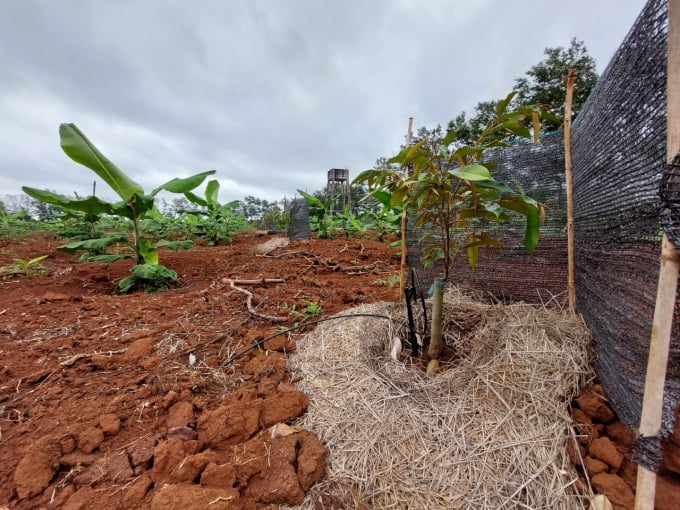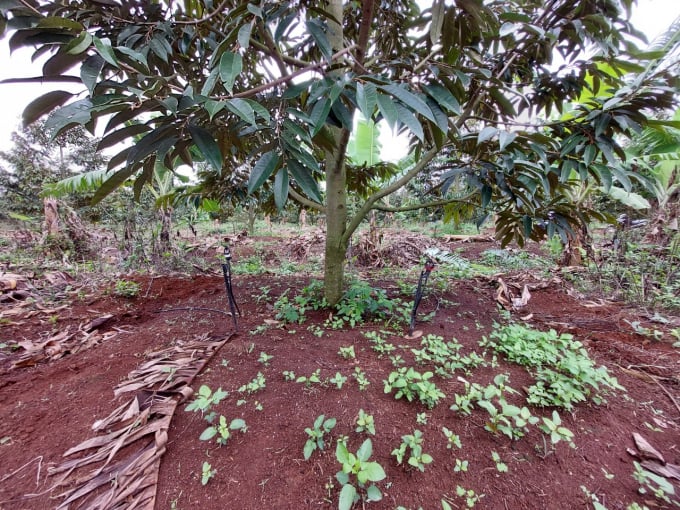May 30, 2025 | 22:12 GMT +7
May 30, 2025 | 22:12 GMT +7
Hotline: 0913.378.918
May 30, 2025 | 22:12 GMT +7
Hotline: 0913.378.918
Those are the main points in the exchange between the Vietnam Agriculture News and Dr. Nguyen Minh Chau, former Director of the Southern Horticultural Research Institute regarding the abuse of chemical fertilizers and pesticides in agroproduction in the Central Highlands.

Dr. Nguyen Minh Chau.
Dear sir, the years-long abuse of chemical fertilizers and pesticides by Central Highlands farmers is adversely affecting and destroying the environment in general and the land in particular. Due to overuse of chemicals, many pepper gardens fell ill and died in mass, and many areas of fruit trees such as durian are also at risk. Does this situation hold certain similarities to the chemical input abuse in fruit tree production in many localities in the Mekong Delta?
The mass death of pepper trees and durian trees at risk of suffering the same fate in the Central Highlands can be traced back to the excessive use of chemical fertilizers and pesticides. But first of all, the cause lies in farmers. They plant them wrong.
The basic principle for dealing with plant pests is not treatment but prevention. Prevention stands as the first solution, and treatment is only when the situation can't be helped. But if you want to prevent any disease, you must understand that disease.

Avocado trees in the USA are grown on high beds to limit pus disease. Photo: Nguyen Minh Chau.
Scientific studies have confirmed that trees with pus should not be planted low below the ground, but must be planted on mounds or in long rows to ensure drainage. Drainage is the most basic measure to prevent pus disease.
However, many Central Highlands farmers grow pepper, durian, and avocado in holes, making the stumps prone to stagnation when it rains heavily, creating favorable conditions for the disease to thrive. Thus, in terms of farming techniques, it was wrong from the very beginning.
False techniques lead to clumsy fixes through more chemical pesticide use, leaving heavy consequences to the environment.

New durian planting model in high well-draining beds of the Western Highlands Agriculture and Forestry Science Institute (WASI) and Tay Nguyen Phuoc Lac Co. Photo: Tran Minh Quy.
Central Highlands farmers all have the same reason that these types of trees are highly vulnerable to diseases so they have no choice but to spray pesticides plenty. Is this a fact or it is just them applying the wrong planting methods?
It is true that plants such as pepper and durian are vulnerable to diseases, but that does not mean they should spray pesticides in such an indiscriminate manner.
For example, apart from pus disease durian trees receive many attacks from pests. As soon as the durian tree has just produced young leaves, a leafhopper specialized in eating these leaves can make its appearance on the tree.
Therefore, in addition to having to plant the right techniques for these crops, farmers also have to know how to prevent pests and diseases properly: when durian produces young leaves farmers must spray immediately to protect the leaves. They should not leave the plant unattended and spray only after powdery mildew appears.

Four-year-old durian planted in high beds, disease-free. Photo: Tran Minh Quy.
Excess use of chemical fertilizers and pesticides by Central Highlands farmers leads to heavy consequences for their own families. Looking at a broader view, it is the destruction of the environment and land. What can we do to make them change their ways and give up bad farming practices?
The State must assist farmers in terms of gaining access to disease and pest resistant pepper, durian and avocado rootstocks. There are already resistant rootstocks in these crops, but in general farmers do not know or know but do not care to purchase. One evident proof is that old, non-resistant rootstocks are still being sold in abundance.
There must also be an establishment of new and effective planting models for these plants, applying the right planting and pest prevention techniques while further promoting the use of organic fertilizers. This is a matter of importance.
The State needs to more closely manage the fertilizer and pesticide market, vigorously remove unsafe products specifically not allow agents to sell products on the banned list to farmers.
Small business farmers are often dominated by agro-input dealers in the area. This is also one of the reasons why farmers use too much chemical fertilizers, even using banned chemicals, fake fertilizers with fake brands. Will promoting the development of cooperative economic models in the Central Highlands lessen the severity of this situation, sir?
I believe that promoting cooperative economic models in the Central Highlands will greatly ease the current chemical abuse. By clearly stating operating criteria right from the name, cooperatives will realize that they have a responsibility to farmers from production to consumption.
When helping farmers with production, the cooperative will have to have a technical department that will work closely with farmers and guide them toward proper cultivation techniques. Cooperation's assistance in product consumption will help farmers' agricultural work become more efficient and more stable. There will be nothing more wonderful for farmers than cooperative production.
Thank you, sir!
Translated by Samuel Pham

(VAN) Several scientists and farmers are experimenting with soil treatment in some key durian-growing regions such as Cai Lay (Tien Giang), Dak Song, Gia Nghia, and Dak R’lap (Dak Nong).
/2025/05/25/4127-3-073637_820.jpg)
(VAN) Thanks to the promotion from an FAO-implemented project, vegetable production in greenhouses in Moc Chau has seen strong development, from 1.5 hectares in 2021 to nearly 50 hectares in 2024.

(VAN) FAO has recently supported USD 140,000 to implement the project 'Risk mitigation human-animal interface risks through disease control initiatives in pig farming.'

(VAN) The People's Committee of Tra Vinh province has approved an adjustment to the investment policy for the Green Hydrogen Plant project, increasing its area to approximately 52.76 hectares.
![Reducing emissions from rice fields: [2] Farmers’ commitment to the soil](https://t.ex-cdn.com/nongnghiepmoitruong.vn/608w/files/news/2025/05/05/dsc08881jpg-nongnghiep-140632.jpg)
(VAN) Clean rice cultivation model in Thuong Tan commune, Bac Tan Uyen district, is assisting local residents in achieving sustainable agriculture by substantially reducing costs, increasing productivity, and protecting the environment.

(VAN) At the conference to disseminate Resolution No. 68, AgriS introduced its digital agricultural ecosystem and reaffirmed its commitment to accompanying the Government in promoting private sector development and sustainable agriculture.

(VAN) 'Blue Ocean - Blue Foods' initiative is designed to restore marine ecosystems and establish sustainable livelihoods for local communities by cultivating a minimum of 1,000 hectares of cottonii seaweed in the first three years.